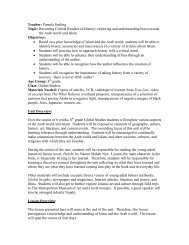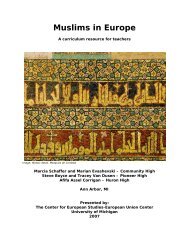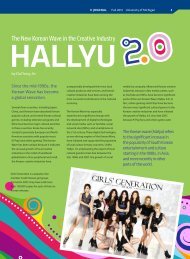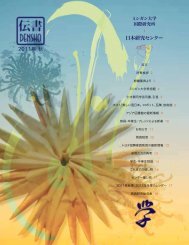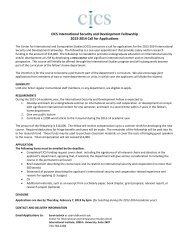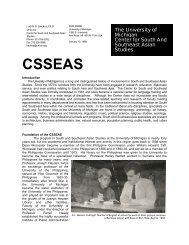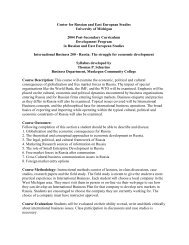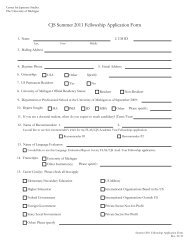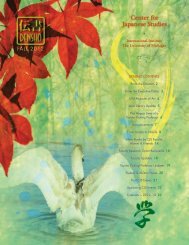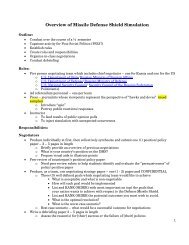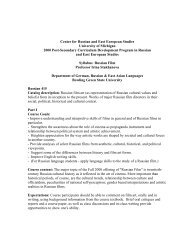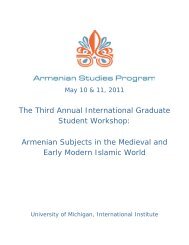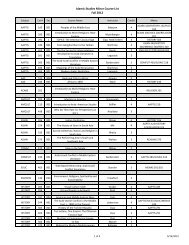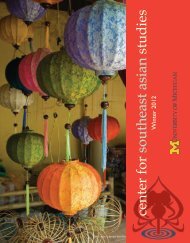Fall 2009 - International Institute - University of Michigan
Fall 2009 - International Institute - University of Michigan
Fall 2009 - International Institute - University of Michigan
You also want an ePaper? Increase the reach of your titles
YUMPU automatically turns print PDFs into web optimized ePapers that Google loves.
New Dimensions in Outreach:<br />
Teaching about Islam and the Middle East<br />
Outreach to the local community, in particular educators in the Ann Arbor area, around the state <strong>of</strong> <strong>Michigan</strong>, and across the country, is a<br />
central part <strong>of</strong> CMENAS’ mission, as defined by the federal government’s Title VI program. In the past year we conducted three major<br />
programs, two <strong>of</strong> them with substantial outside funding, which together move our outreach to a new level.<br />
The World History Initiative<br />
The state <strong>of</strong> <strong>Michigan</strong> decided on new standards for its social studies<br />
curriculum for middle and high school, introducing a wide range <strong>of</strong> global<br />
topics emphasizing interconnectedness and interaction <strong>of</strong> cultures through<br />
trade and movement. While area studies experts and specialists in history<br />
and social studies education are excited about the new curricula, teachers<br />
are <strong>of</strong>ten overwhelmed by the demand to teach world areas and historical<br />
periods without training. Pr<strong>of</strong>. Robert Bain from UM’s School <strong>of</strong> Education<br />
was one <strong>of</strong> the lead authors <strong>of</strong> the new standards, and is well aware <strong>of</strong> the<br />
problem. In order to help teachers succeed in their new subjects, Pr<strong>of</strong>.<br />
Douglas Northrop (formerly CMENAS associate director, now the director <strong>of</strong><br />
CREES) and Pr<strong>of</strong>. Bain have started a collaborative initiative that includes<br />
all area studies centers at UM: the World History Initiative. WHI will over the<br />
next few years conduct a series <strong>of</strong> workshops with the goal <strong>of</strong> helping<br />
teachers develop original curriculum units that address the new standards<br />
directly. They will be piloted by their authors, vetted by the School <strong>of</strong><br />
Education, and subsequently available for other teachers. WHI will monitor<br />
implementation and <strong>of</strong>fer opportunities for revision and improvement<br />
throughout the process. WHI thus will function as a model <strong>of</strong> collaboration<br />
that directly and strategically responds to the new requirements at the state<br />
level, and provides area expertise both in the application <strong>of</strong> the standards<br />
and to the teachers around the state implementing them.<br />
Fulbright GPA in Turkey<br />
“We came from the US in order<br />
to learn more about this … uh,<br />
complicated country” – How<br />
many times did I introduce our<br />
group <strong>of</strong> sixteen American<br />
educators during our five weeks<br />
in Turkey in this way? Arguably,<br />
it is this complicated character,<br />
multicultural heritage and multiple social and political divisions that make<br />
Turkey an ideal destination for those wanting to study foreign culture and history<br />
with all its unforeseen complexities. In the summer <strong>of</strong> <strong>2009</strong> CMENAS won<br />
a Fulbright grant to take American K-16 teachers on a study tour to Turkey. It<br />
was a mixed group, including an elementary school arts teacher, several history<br />
and English teachers at various levels, and instructors in literature and arts<br />
in community colleges and universities. With the CMENAS director as travel<br />
director, guide, and host, NES doctoral student Frank Castiglione as assistant,<br />
Şeyda İşler as local support, and with constant backing from CMENAS at<br />
home, we explored all periods <strong>of</strong> Anatolian history from the Paleolithic site <strong>of</strong><br />
Çatalhöyük, through Hittites, Greeks, Romans, Byzantium, and the Ottoman<br />
Empire, to the modern cities <strong>of</strong> Istanbul and Ankara. For several days, we<br />
enjoyed the hospitality and the vibrant intellectual climate at Sabancı <strong>University</strong><br />
in Istanbul; the lectures by their faculty helped us to especially<br />
understand the culture and society <strong>of</strong> modern Turkey. Pr<strong>of</strong>.<br />
Hülya Adak, our partner at Sabancı, also organized a conversation<br />
with participants in Sabancı’s Purple Certificate<br />
Program, a UN sponsored program teaching gender equality<br />
and human rights for women and children to teachers from<br />
different Turkish cities. We also met with community leaders<br />
(special thanks to Kevork Bardakjian for facilitating our<br />
meeting with the Armenian Patriarchate), NGOs, and<br />
representatives <strong>of</strong> the US and the EU in Turkey.<br />
For the participants, however, the end <strong>of</strong> the trip was not the<br />
end <strong>of</strong> the project, but a beginning: working closely with our<br />
outreach expert Amber Blomquist, every participant produced<br />
a curriculum unit, which will be tested, and retested, before it<br />
will be made available to other teachers via our website, as<br />
well as via one <strong>of</strong> the most comprehensive international and<br />
area studies outreach websites available to the pre-collegiate<br />
educator, outreachworld.org.<br />
2<br />
Summer <strong>2009</strong> Turkey Fulbright GPA Participants<br />
Continued on page 5



